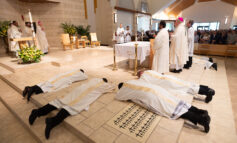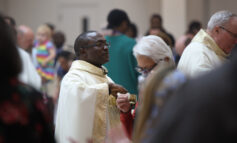By Father John Bayer
Special to The Texas Catholic
With the Solemnity of Pentecost, the long journey through Lent, Holy Week and Easter is over – a liturgical marathon stretching from February 10th to May 15th this year. You might think we can now relax our festive spirits and settle into the “ordinary” time of the liturgical year. Not so fast! For the first Sunday after Pentecost is yet another solemnity – Trinity Sunday.
At so many feasts, we celebrate events in the history of our salvation like the birth, passion, resurrection and ascension of the Son of God, or the descent of the Holy Spirit. We celebrate the “good news” that God visits us in order to redeem and share his life. We praise the Father in faith, hope and love for sending the Son and Spirit to make our lives full of promise and beauty.
Trinity Sunday is a little different. At this celebration, our worship has a more gratuitous character. What I mean is that on this solemnity, unlike pretty much all the others, we do not call to mind a particular event in the history of our salvation. Our intention here is not first and foremost to worship God in thanksgiving for what he has done for us. Rather, our first intention is to worship him for his own sake. Trinity Sunday is a humbling celebration. On this solemnity, we declare that God is beautiful and praiseworthy in himself, before and apart from anything he does for us. In the first reading this year, which is taken from Proverbs 8:22-31, we contemplate the inner life of God even before creation. In the responsorial psalm, taken from Psalm 8, through pondering creation we come to realize how the Creator does not need us: “What is man that you should be mindful of him, or the son of man that you should care for him?” (Ps 8:4).
God is beautiful even apart from his marvelous deeds. Recognizing his independence from us, far from diminishing our sensitivity to his love, helps us to realize that his deeds emerge from the generosity of his heart – and not from any “neediness” or compulsion. God is a free lover. He does not need us. And precisely for that reason he is the best of lovers.
Moreover, on Trinity Sunday we see that God is not only loving toward us. He is loving in himself. In himself he is love itself, for “God is love” (1 Jn 4:8). In his inner life apart from us, God already possesses all the perfections and beauty of a lover – and therefore he is worthy of our praise. He is not a lonely, loveless king isolated from others by his superiority. And yet he is not kept company by a lover independent from himself. There can be only one Absolute, one God, because if there were two, then each would be relative (not absolute) to the other, and thus the search of reason for the unity of reality would short circuit. God is a single king. But he is not lonely in his oneness, for he “keeps company” in the mystery of his inner life, which is the dynamic interplay of personal relations between Father, Son and Holy Spirit.
Yes, the Trinity is a mystery. And even though intellectual giants throughout the centuries find in him their highest inspiration, the mystery of the Triune God has sometimes been scorned as the ridiculous “mathematics” of Christianity. If you want to explore the credibility and power of this mystery, consider The God of Jesus Crist by Joseph Ratzinger (Pope Emeritus Benedict XVI). Or, setting aside books of theology, you might simply consider the hope so many of us share, Christians and non-Christians alike. For many of us live guided by the hope that love is real and that it conquers all. So, we strive for an absolute unity in our communities that nevertheless does not eliminate the individual. In other words, we live hoping that the origin and end of all things blesses and enables such a harmony of unity in diversity. I do not know how others have so bold a hope. As Christians, the Trinity is the “reason for our hope” (1 Pt 3:15). For in the one God who is love, we have a reason to believe that love is the meaning of all things (1 Jn 4:8). In the Trinity, who is one God in three personal relations, we have a reason to hope that our communities too might enjoy an analogous harmony through unity in diversity.
Father John Bayer, O.Cist., is a theologian and monk at the Cistercian Abbey of Our Lady of Dallas in Irving.



